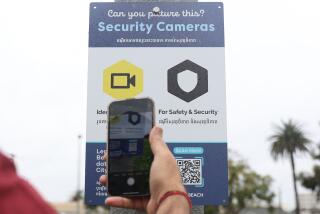Tales From the Encrypt : High-Tech Hats and Hot Issues Materialize at Privacy Conference
- Share via
CAMBRIDGE, Mass. — Most mornings, Steve Mann still awakes in the form of a human, but his soul is that of a cyborg, and he is working on perfecting the mutation.
His typical get-up includes a skeletal PC in a pack around his waist, dark glasses that shade a miniature computer screen beneath his right eye, a video camera and an antenna in his hat that wirelessly connects him to the Internet through a network of antennas he’s erected on rooftops throughout town.
“I’m interested in computer-mediated reality,” says the MIT graduate student. “And ‘smart clothing’ represents a promise for mitigating the loss of privacy associated with the Information Age.”
At the sixth annual Computers, Freedom and Privacy conference here last week, Mann suggested that in lieu of government surveillance cameras, people could wear their own cameras and watch out for each other over the Net. The idea was well-received--at least in spirit.
But hacker stunts and demos of gadgets such as digital wallets served mostly as a welcome diversion from the standoff over encryption policy--the arcane, crucial question this group has been grappling with for years.
At the heart of the issue is how to balance national security and public safety with the right to privacy in an age when technology has made it far more difficult for law enforcement to tap into private communications.
The government has long outlawed the export of strong encryption programs. But civil libertarians, the security fanatics known as cypherpunks--and, increasingly, American corporations--are pushing for a loosening of those restrictions. Two bills have been introduced in the Senate that would do that to varying degrees.
The CFP was conceived as a meeting ground for ideological opposites united only in their superior understanding of the impact that computer networks and their relative degree of security may have on society.
And it is still perhaps the only place to find arch-cryptographer and privacy activist John Gilmore chatting it up with the likes of Dorothy Denning, a computer science professor at Georgetown University who has long argued that the government must have a way to gain access to encrypted computer data.
But as the Internet usage the world over continues to explode, there is a sense of some desperation from both sides that the debate needs to move forward. “I wasn’t hissed at this year, so I guess that’s progress,” notes Denning. “But then, I didn’t speak any of my own views.”
Denning moderated a panel that included Michael Nelson, the White House point man on encryption policy.
Although the government has largely given up on the ill-fated “clipper chip” plan, it has now proposed a plan that would require the “key” to every encryption algorithm to be deposited with a third party. If law enforcement officials had enough evidence of criminal activity to get a warrant, they could then compel the third party to hand over the key.
Privacy advocates have criticized such a policy and, in a moot court hearing here last week, a similar Cryptography Control Act was found unconstitutional by a panel of real-life judges.
Gilmore, who coined the cyber-aphorism “The Net sees censorship as damage and routes around it,” proposed an updated version: “The society sees the government as damaging and routes around it.”
But, says Nelson, “If we allow strong encryption to spread overseas, we will see an increase in crime and terrorism in the U.S. and lots of people will die. You need to think of a better solution.”
Amy Harmon, who covers multimedia and cyberspace for The Times, can be reached at amy.harmon@latimes.com






